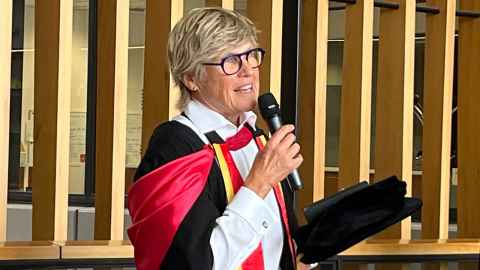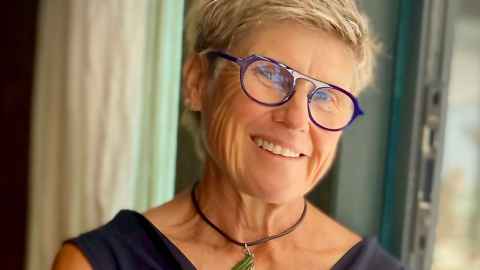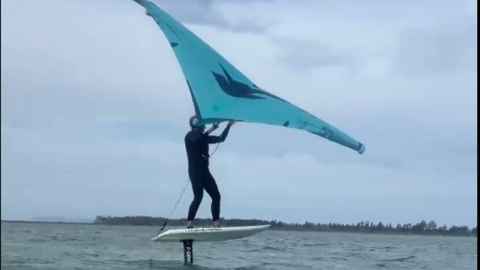From monkey bars to a PhD: a bold leadership journey
14 May 2025
Liggins Institute PhD graduate Peg Lockyer hated skirts, loved sport and thrived in leadership roles. Her research focused on how school-aged children can get active and be leaders too.

Newly-capped Peg Lockyer has been a strong advocate for physical activity, education and justice, but it’s not always been an easy ride.
As a six-year-old in the early 1970s she pushed to wear shorts not skirts at school so she could swing on the monkey bars, and as a national canoeing champion she faced a sporting body whose leadership was later exposed as rife with bullying and harassment, particularly for women.
She started police training, but chose to pull out after recognising bigotry and unconscious racism in the force at the time, and when she switched to teaching she came to realise that even a successful and ambitious teacher and school leader would find it hard to rise to the top in a profession where female high school principals were often expected to fit a certain mould.
As an athlete in her early 30s, Lockyer was diagnosed with rheumatoid arthritis, and twenty years later, just when she was starting a PhD evaluating a schools-based peer leadership physical activity programme, it was Covid-19 that locked down both schools and sports.
But her lived experience – good and bad – has also been a critical part of the way she chose to conduct her research, as well as a factor in its successful completion.
“I always wanted to do postgraduate study but I didn’t like statistics and probability and I thought you had to be of a certain scientific ilk to do research. Then I discovered narrative and storytelling and other qualitative research methods, where you can incorporate your own personal experience into your work.
“It was amazing. From masters onwards I started loving being at uni.”

Lockyer, progressing rapidly up the ranks in her teaching career, did her first University of Auckland masters degree in education, while at the same time working full time as a senior leader in a secondary school.
Her second masters, at the University’s Law School, came out of her position as associate principal, a job involving a lot of school disciplinary processes.
“My role was hard. It wore me down; I became a person I didn’t like. For my masters I focused on privacy in schooling, on restorative justice in disciplinary processes, and on human rights in education. As part of my study I worked with the amazing Professor Bill Hodge, and I wrote a manual for schools so they couldn’t mistakenly suspend or expel students. I felt there was bad practice and I wanted to help schools and parents.”
At PhD level, Lockyer took it one step further. She had been working with gym and fitness company Les Mills to take its Born to Move fitness programmes for young people into schools, training the students, including at primary level, to lead physical activity classes for their peers.
Her doctorate, a transdisciplinary piece of research across the Liggins Institute and the former Faculty of Education and Social Work, was to investigate the benefits, implementation, and sustainability of this peer leadership model.
“I used a mixed method approach. A systematic review, a questionnaire for the student leaders’ voice, then interviews with parents, senior leaders and teachers involved in the programme.
“Each part informed the next one and the final part involved complexity theory. Schools are very complex environments, and this needs to be taken into account when working with them."
Leaders don’t have to be sporty types; the school-aged children loved the chance to lead their classmates, moving to music.
Lockyer says the research showed Born to Move classes led by the primary and intermediate students themselves provided significant benefits for those children.
“The programme caters to all. Leaders don’t have to be sporty types; they loved the chance to lead their classmates, moving to music. Teachers and parents noticed their confidence levels increasing too.
“They were so amazing, getting up in front of a hall full of school friends and instructing a fitness class! Awesome. How many adults could do that?”
Liggins Institute’s Professor Mark Vickers, one of Lockyer’s supervisors, says her extensive experience in sport and teaching was critical to the project.
“It was evident from the outset how engaged and passionate Peg was about her research on physical activity initiatives in schools, and she became quite emotional on several occasions when discussing anecdotes from her PhD research interactions.”

It’s a similar conclusion from her other supervisor, Professor Deidre Le Fevre from the Faculty of Arts and Education.
“Peg’s thesis focussed on young people, their skills, strengths, and leadership capacity. Her determination to represent the important and varied voices of young people in research is central to her contribution. So too is the way she worked in an interdisciplinary way across faculties bringing together powerful research ideas."
Lockyer says being based at the Liggins Institute for the four years of her PhD has been “a real privilege”.
“I’ve loved working at Liggins – being around the huge important research the institute does. It’s inspiring and the people here are amazing.
“I’d love to do another research project.”
Interested in postgraduate study at the Liggins Institute? Find out more.
Media contact
Nikki Mandow | Research communications
M: 021 174 3142
E: nikki.mandow@auckland.ac.nz